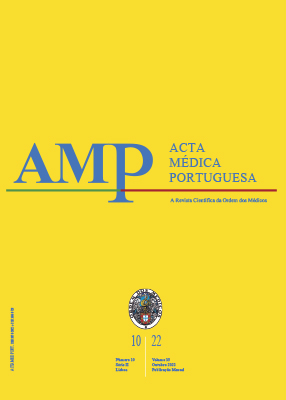European Portuguese Language and Cultural Validation of the Chronic Obstructive Pulmonary Disease Assessment Test
DOI:
https://doi.org/10.20344/amp.15343Keywords:
Portugal, Pulmonary Disease, Chronic Obstructive, Reproducibility of Results, Surveys and Questionnaires, TranslatingAbstract
Introduction: The chronic obstructive pulmonary disease assessment test (CAT) is a self-administered questionnaire that measures health-related quality of life. GOLD proposes using this questionnaire, since it provides thorough coverage of the impact of chronic obstructive pulmonary disease (COPD) on well-being. This questionnaire has been widely used in daily clinical practice in Portugal, but it lacks validation for European Portuguese. The aim of this study was to carry out the cultural adaptation and validation of the CAT questionnaire so that the most appropriate version can be made available to Portuguese researchers and clinicians.
Material and Methods: A cross-sectional descriptive study was performed involving 65 patients with COPD aged 40 years or older. CAT and the previously validated Portuguese-language version of the Clinical Questionnaire for COPD were applied between January 2019 and June 2019. The agreement between the two questionnaires was determined with Kappa agreement with a 95% confidence interval. Spearman correlation was used to find the correlation between two scores.
Results: The 65 patients included in the study were observed in a hospital-based pulmonology clinic [aged 68 ± 7 years; forced expiratory volume in 1 sec (FEV1) 49.86% ± 16.5% predicted]. CAT correlated significantly with all the domains and the overall score of the CCQ (0.47 < r < 0.75; p < 0.001). The bilingual patient interclass correlation coefficient was 0.922; Pearson’s r = 0.928; p < 0.001. The Cronbach’s alpha coefficient was 0.96 (p < 0.001).
Conclusion: The European Portuguese version of the COPD Assessment Test is a valid instrument for measurement of health-related quality of life in COPD patients. The use of validated questionnaires is of great importance since it generates reliable and reproducible evidence for use either in research or clinical practice.
Downloads
Downloads
Published
How to Cite
Issue
Section
License
Copyright (c) 2022 Acta Médica Portuguesa - Ordem dos Médicos

This work is licensed under a Creative Commons Attribution-NonCommercial 4.0 International License.
All the articles published in the AMP are open access and comply with the requirements of funding agencies or academic institutions. The AMP is governed by the terms of the Creative Commons ‘Attribution – Non-Commercial Use - (CC-BY-NC)’ license, regarding the use by third parties.
It is the author’s responsibility to obtain approval for the reproduction of figures, tables, etc. from other publications.
Upon acceptance of an article for publication, the authors will be asked to complete the ICMJE “Copyright Liability and Copyright Sharing Statement “(http://www.actamedicaportuguesa.com/info/AMP-NormasPublicacao.pdf) and the “Declaration of Potential Conflicts of Interest” (http:// www.icmje.org/conflicts-of-interest). An e-mail will be sent to the corresponding author to acknowledge receipt of the manuscript.
After publication, the authors are authorised to make their articles available in repositories of their institutions of origin, as long as they always mention where they were published and according to the Creative Commons license.









